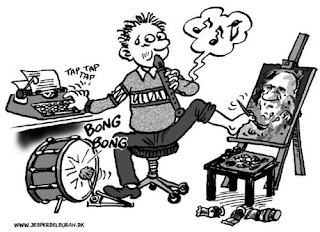PRODUCED, WRITTEN & DIRECTED BY ME ART
 |
| By Deleuran |
There are more music producers scattered
all over Kampala than there are studios for us from which to produce.
Considering the film industry, it too is growing rather fast and with it
directors and producers are sprouting faster than seeds at Kawanda Agro Research. It is a good thing that there is a vibrant enough buzz
to interest more people to join these industries. However, it would be better
if people went into it knowing in what capacity they are joining the industry
and what skills are required to execute particular tasks. Unfortunately, this
is rarely the case.
These days everyone who can rig together a
computer with a microphone and paste together some beats is a music producer.
Similarly, many chaps are apparently film directors/producers because they own
and /or can switch on a DSLR camera and point it at something. One has to start
somewhere of course and indeed most of us had very humble beginnings. I can
recall the miserably sorry recordings that I first made; horrid wouldn’t begin
to describe them. My first short film is even more pitiful. Luckily I spared
the public those frightful horrors. But with the new technologies available in
production today, and the many distribution avenues online, most people feel
there are no skills required at all but just the acquisition of the equipment
and a tickle of the computer mouse! It seems many are stumbling into these
industries with their zips still undone.
MUSIC MAKING TODAY
 |
| A very basic music making set-up |
 |
| MSR Studios in LA |
In the hands of a good producer and
engineer, these new technologies can be brilliant indeed. Today one can make an
excellent record in their tiny bedroom in Kawaala which can sonically compete
with something from flashy large studios in LA. These infinite possibilities
have certainly allowed many of us to exist in an industry that perhaps wouldn’t
have accommodated us 20 years ago. Along the way many imposters have filtered
through the sieve too because the technology has made the holes too big. Many
in the industry can’t tell a producer apart from an engineer or an arranger
from a beat maker. Heck, it is getting even hard to define a musician now! The
focus quite often is pointed to the equipment and not the skills required to attain
certain sounds, textures, emotions and artistic goals.
WHAT IS THE ROLE OF A MUSIC PRODUCER?
A music producer is the person who directs the recording of a song from scratch
to finish. They may be instrumental in even choosing that song on the basis of
their judgment of both the artist’s abilities and consideration of the
prospective audience. The producer will get and liaise with all the parties
working on the song such as session instrumentalists and will also book a
suitable studio for the sessions. He/she will select a
good sound engineer for the job and beat makers and/or arrangers if necessary.
A producer may perhaps also play
instruments, in which case he/she may also arrange the song or be the original
composer. It is the producer’s job to set parameters that would best allow for
all parties working on the song or album to do their best to get it to 100%. A
producer will make sure that an album sounds as a cohesive piece of work as
opposed to a random cluster of songs. They will endeavour to bring out the best
of the artist and decide on a sonic context; a sound. Usually they are hired
because of their skill at attaining particular flavours.
It is not unusual these days to find one
person wearing all the hats of audio engineer, producer, arranger, beat maker,
session instrumentalist and even song-writer. Self producing artists such as
Prince, Stevie Wonder, Beck etc proved it was possible. There are now many
outfits with all-in-one producers who encompass various roles. This is not a
problem as such; it is simply a sign of the times. My own LittleRoom Studios
sometimes works this way but this kind of production on occasion can become too self-involved. During a session of Michael Jackson's Billie Jean, Quincy Jones said "Let's leave space for God to come into the room.". Its not easy to do this when working alone.
 |
| The two greats: Quincy Jones and engineer Bruce Swedien 1982 |
It is also possible for a producer to
produce a record without playing a single musical note on it or touch a single
piece of recording equipment in the studio. They would basically project-manage
the operation, hiring the right people and artistically steering the
proceedings through decisive direction to the different parties involved. There
are some records which I have produced that weren’t done in my studio; I wasn’t
the audio engineer or a session player but simply coached the singer, wrote
some arrangements for the musicians to play and directed the pre-session
rehearsals and recording (tracking) of it. For some I wasn’t even there for the
mixing of the material although I had a final say on its sound.
I would recommend anyone who claims to be a producer to read this Quincy Jones interview.
INDEPENDENT FILMMAKING
In film, advances have been similarly fast
and very liberating. This has actually allowed for our humble banana republic
to enter the field. This would have been unfathomable even just 15 years ago! Technology
is more accessible and relatively easy to use. The new digital cameras on the
market have auto focus, auto white-balance, auto shutter, auto-align and just
about anything you can think of auto- bloody-matic. I guess if they could they
would make them “auto shoot” so the user perhaps wouldn’t even point the lens
anywhere, it would just capture sensed drama.
 |
| DSLR cameras |
These devices are generally idiot proof now,
and this is not a bad thing; it is a very good thing. The problem is, this ease
of use fools some people into thinking that filmmaking is a doodle and they
forget about learning and developing their skills in the art of cinematic storytelling.
So you find someone with fancy cameras, jibs and dollies on location; even
swinging cranes and flying camera drones and all the necessary accessories but
with a rotten result at the end of it all. This is at times because they
plainly don’t know the craft or the personnel haven’t been assigned to the
right roles, or the wrong equipment is assigned for the project. People appear
to enjoy seeing fancy gadgets and complex filming paraphernalia on set
regardless of whether the production needs it or not. The bajja kutya syndrome.
An understanding of the key filmmaking
roles of producer and director is important if one is to escape mediocrity.
Even Hollywood, Bollywood and Hong Kong cinema started out with a lot of dodgy
work and just simply thrived on boundless energy and incessant filmmaking.
Nollywood (Nigerian) has repeated this pattern and though their films were
largely of poor quality before, of late it is a very different scenario. One
can’t fault us for joining the game too. However, it would serve us well to
know a little bit about the ins and outs of the industry. It is clear from
successful films that it is rarely the equipment that determines a good film.
If the people helming a project know their roles, a great deal can be milked
from very basic equipment and resources.
WHAT DOES A FILM PRODUCER DO?
The film producer is he/she who runs the
whole production. They are there from conception to delivery and distribution.
They source the story and script; they look out for material to adapt and for
writers to develop and deliver a script. At times they may even have written
the story or actual script themselves. They source the finance and attribute
the budget; they hire the different technical personnel from director to crew
and to editors and post-production colourists etc. A film producer oversees the
project from pre-production, shooting (principal photography), post-production
up to exhibition and distribution.
They will not only seek financiers but also
markets, festivals and deals for the production during its making and well after
its completion. They may provide some artistic guidance to the director as well
and it is their job to ensure that the project remains on schedule and within
budget. Usually they can hire or fire anyone on the production. These powers
may be different if they, themselves were hired by a company or an executive
producer; or if there is a partnership deal with the director.
THE DIRECTOR
He/she is responsible for artistically
steering the production in such a way as to capture images that transform a
story from paper to the screen. They are usually answerable to the producer and
depending on the deal arranged even a writer on occasion can have some say on
what the director can or can’t do. The director may have control on deciding a
cast usually with approval from the producer; they may also be able to decide
upon certain technical crew that fit their style. This would most usually be
the cinematographer and/or camera operators. Directors have also been known to
choose their own editors who understand their way of working. Most times these
will be chosen with approval of the producer.
 |
| Charlie Chaplin directing Modern Times 1936 |
It is common these days for the director to
also be the producer of the film and at times even the script writer.
Independent filmmaking often blurs the line between roles sometimes to the detriment
of the production but not always. Filmmakers such as Woody Allen have been
doing this successfully for years. Going back to old Hollywood, Charlie Chaplin
usually did absolutely everything; produced, directed, wrote scripts, starred
in the movie and even composed the music. Other directors like Iranian
Kiarostami used to do his own cinematography alongside producing, writing and
editing. So it’s not new for people to wear different hats in production but it
is important that one is aware they are wearing them and to be suited to wearing them.
If you claim to be a filmmaker, the Francis Ford Coppola's Apocalypse Now account is worth a read. The same site holds tonnes of information on seminal films that are a great study of the art form.
With the advent of new affordable
technologies filled with ease of use and access, it is easy for one to deem
these technical roles easy and interchangeable. This would be a mistake. The
people who are able to do these things have often worked in one role or other
at different periods of their careers and developed the skill-set required. No
doubt it is possible today to make a professional record alone or to steer a
film production single handed but it would serve one well to first understand what
this entails rather than bound in like a pack of wolves on a carcass. The
results may not be too pretty!




Comments